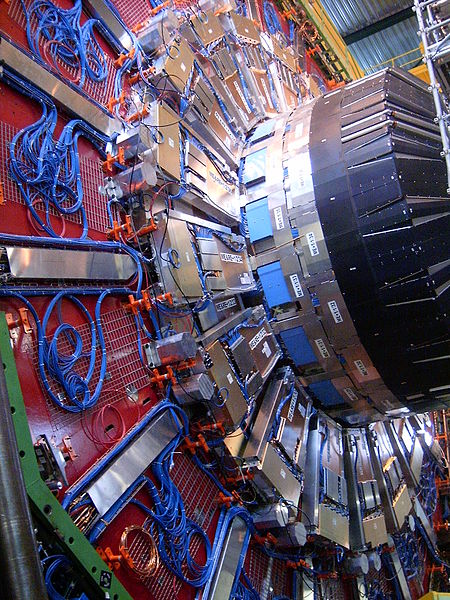 |
| Richard Feynman, Los Alamos ID badge |
Certainly, as a practical endeavor, many, many thousands of scientists and engineers around the world today understand quantum mechanics. They use it routinely in their work, whether designing computer circuits or predicting the outcome of the collisions of the protons that hurtle toward each other at near light speed at the intersections of the beam lines of the Large Hadron Collider outside of Geneva, Switzerland. Indeed, the related theory of Quantum Electrodynamics, of which Feynman was a pioneer, is, hands down, the most successful physical theory ever devised as far as the precision of its predictions is concerned. It would be hard to beat.
 |
| Compact Muon Solenoid at the LHC at CERN |
And this is where, to a certain extent, they part company with Feynman, whose discouraging words might more accurately - and perhaps more hopefully - be expressed as, "no one understands yet what quantum mechanics means." The fact of the matter is that, after almost nine decades of earnest striving, there is no agreed upon interpretation of what quantum physics says about the very nature of the world it so successfully models. Some have more currency than others, but none has proven so superior that it has vanquished its competitors.
In my opinion it is our failure to formulate a convincing interpretation that fuels the controversy that surrounds the question of quantum physics and consciousness which has motivated the discussion at hand. The absence of a conclusive answer to the stubborn question of meaning has been an invitation for all contending interpretations of quantum mechanics, of whatever stripe, to enter the fray.
That said, I do think that the central concepts of quantum physics are in fact understandable by "ordinary" people, that is if they are willing to let go of preconceptions and to imagine themselves, instead, as inquisitive travelers to an unexplored country. This will be the topic of the next post in this series.

Does Anyone Understand Quantum Mechanics? by Marc Merlin is licensed under a Creative Commons Attribution-NonCommercial-NoDerivs 3.0 Unported License.
Based on a work at thoughtsarise.blogspot.com.
1 comment:
Very well said. Looking forward to the discussion.
Greg McClune
Post a Comment